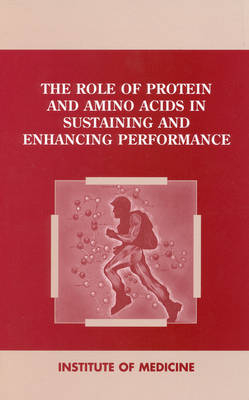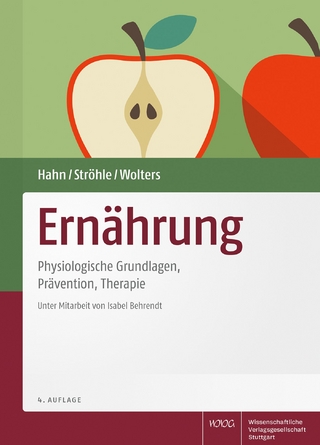
The Role of Protein and Amino Acids in Sustaining and Enhancing Performance
Seiten
1999
National Academies Press (Verlag)
978-0-309-08382-9 (ISBN)
National Academies Press (Verlag)
978-0-309-08382-9 (ISBN)
- Titel ist leider vergriffen;
keine Neuauflage - Artikel merken
Designed to inform both civilian and military scientists and personnel about issues related to nutrition and military service, this book covers such topics as the effects of aging and hormones on regulation of muscle mass and function, alterations in protein metabolism due to the stress of injury or infection, the role of amino acids, and more.
It is a commonly held belief that athletes, particularly body builders, have greater requirements for dietary protein than sedentary individuals. However, the evidence in support of this contention is controversial. This book is the latest in a series of publications designed to inform both civilian and military scientists and personnel about issues related to nutrition and military service.
Among the many other stressors they experience, soldiers face unique nutritional demands during combat. Of particular concern is the role that dietary protein might play in controlling muscle mass and strength, response to injury and infection, and cognitive performance. The first part of the book contains the committee's summary of the workshop, responses to the Army's questions, conclusions, and recommendations. The remainder of the book contains papers contributed by speakers at the workshop on such topics as, the effects of aging and hormones on regulation of muscle mass and function, alterations in protein metabolism due to the stress of injury or infection, the role of individual amino acids, the components of proteins, as neurotransmitters, hormones, and modulators of various physiological processes, and the efficacy and safety considerations associated with dietary supplements aimed at enhancing performance.
Table of Contents
Front Matter
Executive Summary
I Committee Summary and Recommendations
1 Committee Review
2 Responses to Questions, Conclusions, and Recommendations
II Authored Papers and Workshop Discussions
3 Protein and Amino Acids: Physiological Optimization for Current and Future Military Operational Scenarios
4 Overview of Garrison, Field, and Supplemental Protein Intake by U.S. Military Personnel
5 The Energy Costs of Protein Metabolism: Lean and Mean on Uncle Sam's Team
6 Regulation of Muscle Mass and Function: Effects of Aging and Hormones
7 Effects of Protein Intake on Renal Function and on the Development of Renal Disease
8 Infection and Injury: Effects on Whole Body Protein Metabolism
9 Inherent Difficulties in Defining Amino Acid Requirements
10 Amino Acid Flux and Requirements: Counterpoint Tentative Estimates are Feasible and Necessary
11 Physical Exertion, Amino Acid and Protein Metabolism, and Protein Requirements
12 Skeletal Muscle Markers
13 Alterations in Protein Metabolism Due to the Stress of Injury and Infection
Discussion I
14 Amino Acid and Protein Requirements: Cognitive Performance, Stress, and Brain Function
15 Supplementation with Branched-Chain Amino Acids, Glutamine, and Protein Hydrolysates: Rationale for Effects on Metabolism and Performance
16 Dietary Supplements Aimed at Enhancing Performance: Efficacy and Safety Considerations
Discussion II
Appendixes
A Workshop Agenda
B Biographical Sketches
C Acronyms and Abbreviations
D Proteins and Amino Acids - A Selected Bibliography
E Protein and Energy Content of Selected Operational Rations
Index
It is a commonly held belief that athletes, particularly body builders, have greater requirements for dietary protein than sedentary individuals. However, the evidence in support of this contention is controversial. This book is the latest in a series of publications designed to inform both civilian and military scientists and personnel about issues related to nutrition and military service.
Among the many other stressors they experience, soldiers face unique nutritional demands during combat. Of particular concern is the role that dietary protein might play in controlling muscle mass and strength, response to injury and infection, and cognitive performance. The first part of the book contains the committee's summary of the workshop, responses to the Army's questions, conclusions, and recommendations. The remainder of the book contains papers contributed by speakers at the workshop on such topics as, the effects of aging and hormones on regulation of muscle mass and function, alterations in protein metabolism due to the stress of injury or infection, the role of individual amino acids, the components of proteins, as neurotransmitters, hormones, and modulators of various physiological processes, and the efficacy and safety considerations associated with dietary supplements aimed at enhancing performance.
Table of Contents
Front Matter
Executive Summary
I Committee Summary and Recommendations
1 Committee Review
2 Responses to Questions, Conclusions, and Recommendations
II Authored Papers and Workshop Discussions
3 Protein and Amino Acids: Physiological Optimization for Current and Future Military Operational Scenarios
4 Overview of Garrison, Field, and Supplemental Protein Intake by U.S. Military Personnel
5 The Energy Costs of Protein Metabolism: Lean and Mean on Uncle Sam's Team
6 Regulation of Muscle Mass and Function: Effects of Aging and Hormones
7 Effects of Protein Intake on Renal Function and on the Development of Renal Disease
8 Infection and Injury: Effects on Whole Body Protein Metabolism
9 Inherent Difficulties in Defining Amino Acid Requirements
10 Amino Acid Flux and Requirements: Counterpoint Tentative Estimates are Feasible and Necessary
11 Physical Exertion, Amino Acid and Protein Metabolism, and Protein Requirements
12 Skeletal Muscle Markers
13 Alterations in Protein Metabolism Due to the Stress of Injury and Infection
Discussion I
14 Amino Acid and Protein Requirements: Cognitive Performance, Stress, and Brain Function
15 Supplementation with Branched-Chain Amino Acids, Glutamine, and Protein Hydrolysates: Rationale for Effects on Metabolism and Performance
16 Dietary Supplements Aimed at Enhancing Performance: Efficacy and Safety Considerations
Discussion II
Appendixes
A Workshop Agenda
B Biographical Sketches
C Acronyms and Abbreviations
D Proteins and Amino Acids - A Selected Bibliography
E Protein and Energy Content of Selected Operational Rations
Index
Committee on Military Nutrition Research, Institute of Medicine
| Erscheint lt. Verlag | 15.9.1999 |
|---|---|
| Verlagsort | Washington |
| Sprache | englisch |
| Maße | 152 x 229 mm |
| Themenwelt | Medizin / Pharmazie ► Gesundheitsfachberufe ► Diätassistenz / Ernährungsberatung |
| Sozialwissenschaften ► Politik / Verwaltung | |
| Technik ► Lebensmitteltechnologie | |
| ISBN-10 | 0-309-08382-6 / 0309083826 |
| ISBN-13 | 978-0-309-08382-9 / 9780309083829 |
| Zustand | Neuware |
| Haben Sie eine Frage zum Produkt? |
Mehr entdecken
aus dem Bereich
aus dem Bereich
Indikation, Diagnostik, Therapie
Buch (2024)
Thieme (Verlag)
CHF 109,95
Physiologische Grundlagen, Prävention, Therapie
Buch | Hardcover (2023)
Wissenschaftliche Verlagsgesellschaft
CHF 165,20


